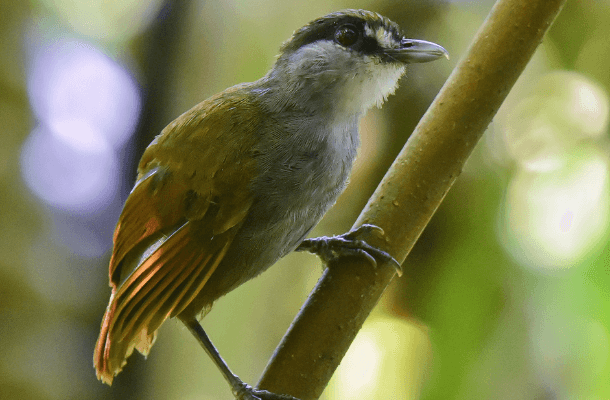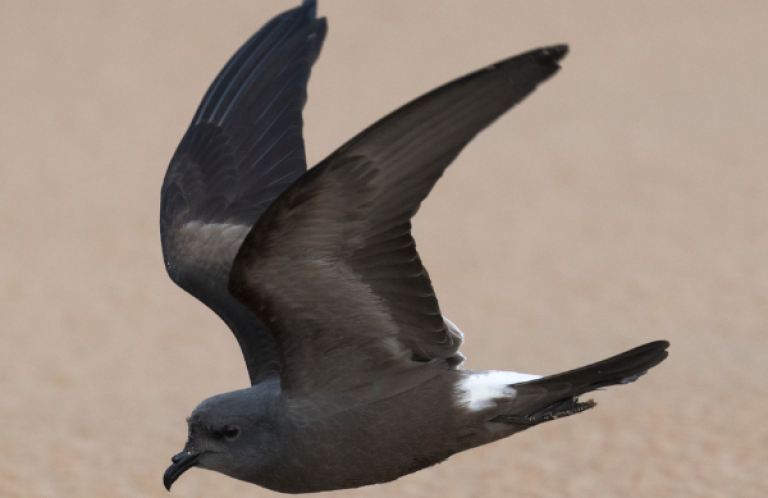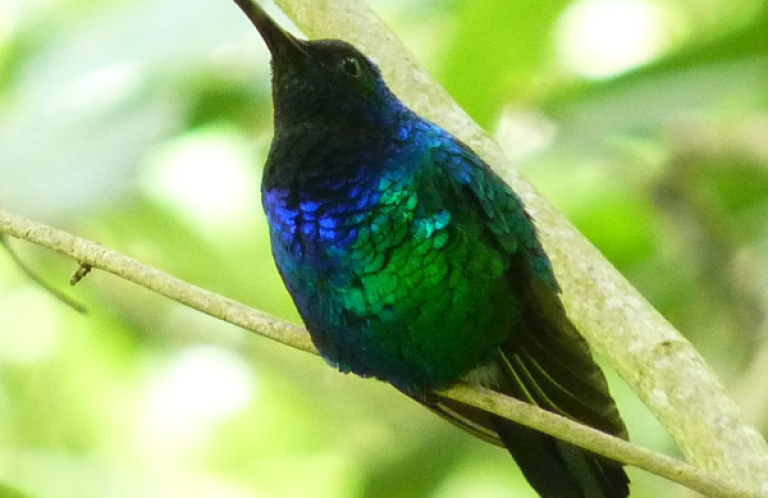“Found” Bornean Bird Sparks Hope and Inspiration for Bird Conservation Efforts
Media Contact: Jordan Rutter, Director of Public Relations| jerutter@abcbirds.org | @JERutter

This photo is one of the first ever taken of the elusive Black-browed Babbler in the wild. Photo by Saktyari
(Washington, D.C., November 10, 2021) After being undocumented for 172 years, the mysterious Black-browed Babbler was observed and videotaped for the first time in the wild by an expedition funded by Oriental Bird Club (OBC) and American Bird Conservancy (ABC). A team of ornithologists observed, photographed, and obtained the first-ever video footage of this species in its habitat in Kotabaru Regency, South Kalimantan, Indonesia, in September 2021.
ABC and partners are working together to find other birds that have gone unseen for years, including an expedition to Venezuela that rediscovered the Urich's Tyrannulet and searches in Colombia for the Sinu Parakeet. These birds — among the world's rarest species — are in urgent need of conservation action.
The Black-browed Babbler had gone unobserved since colonial times. It was initially described by the renowned French naturalist Charles Lucien Bonaparte in 1850, based on a single specimen collected by German geologist and naturalist Carl Anton Ludwig Maria Schwaner from his expeditions to southern Borneo around 1843-1848. This elusive species, widely considered to be Borneo's greatest ornithological enigma, was finally seen again in 2020 after being captured by a local resident.
While the researchers collected some clues about the species' ecology, much of the babbler's life history remains shrouded in mystery. The Black-browed Babbler is currently listed as “Data Deficient” by the International Union for Conservation of Nature (IUCN) with no information regarding its population or range. It is also not listed as a protected species by the Indonesian government due to lack of data, which may make it vulnerable to threats such as poaching or habitat destruction.
In September 2021, a team of ornithologists from Birdpacker Indonesia collaborated with South Kalimantan's Natural Resource Conservation Agency (BKSDA South Kalimantan), becoming the first team to explore the babbler's habitat in an area of rugged limestone hills. The team went under the guidance of Muhammad Suranto, one of the original discoverers, who also co-authored the paper documenting the 2020 rediscovery. On the first day of fieldwork, the team managed to re-find the bird and document its behavior for the first time in the wild.
“It was a breathtaking moment to finally see this species in the wild, as most of its natural history is entirely unknown — so that every single movement we observed can be new to science,” said Panji Gusti Akbar, the lead scientist from Birdpacker Indonesia, who also co-authored the paper reporting the rediscovery.
According to Akbar, a pair of the birds was located in thick undergrowth on the side of a karst cliff, just a few hours after the search commenced. The birds were very secretive and moved quietly, making it extremely difficult to observe them. However, one individual perched close enough for the team to capture the first images and video evidence of the species.
The importance of this finding is noted by Paul Insua Cao, Chair of the OBC Conservation Committee, who mentioned that this is a landmark project as global leaders meet to plan actions to address the climate and biodiversity crisis at COP26 in Glasgow. He also explained that this species' extinction would have been inevitable without this discovery due to widespread and ongoing habitat loss, and that this project brings hope for other poorly known species.
“Significantly, this work has been done by Indonesians reflecting a growing interest in this megadiverse country, to understand and protect its unique natural heritage,” Cao said. “The OBC urges the relevant authorities to do what they can to protect the habitat of the Black-browed Babbler as soon as possible, based on Birdpacker Indonesia's work.”
Dr. Ir. Mahrus Aryadi, Head of BKSDA South Kalimantan, highly praised the Indonesian Birdpacker team and the BKSDA South Kalimantan team, which successfully observed the babbler.
For the next month, the team will continue its expedition in an effort to determine the species' distribution and possible threats — in hopes of clarifying its conservation status and the actions necessary to conserve it.
“This is the first step towards availability of valid and reliable data as a basis for future biodiversity management,” Aryadi said. “BKSDA South Kalimantan will propose the area [where the species was photographed] become an Essential Ecosystem Area.”
###
American Bird Conservancy is a nonprofit organization dedicated to conserving wild birds and their habitats throughout the Americas. With an emphasis on achieving results and working in partnership, we take on the greatest problems facing birds today, innovating and building on rapid advancements in science to halt extinctions, protect habitats, eliminate threats, and build capacity for bird conservation. Find us on abcbirds.org, Facebook, Instagram, and Twitter (@ABCbirds).


















































